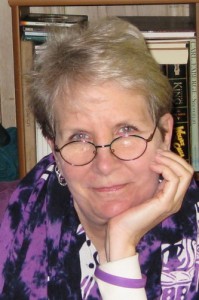
Because of her academic training in anthropology, I thought I’d ask Kim to open this post with just a short examination of funerals as rites of passage. (She’s got a Master’s Degree in the field and has spent over 40 years in the cross-cultural study of funeral ceremonies.) “The fellows whose work I studied in grad school: 19th century anthropologists
Arnold van Gennep, Robert Hertz and their 20th century counterparts Maurice Bloch and Victor Turner; shaped the way I saw these events. It was Gennep who first proposed them to be “rites of passage” marked by three distinct phases. The field work of the others, Hertz, Turner (an intellectual “hero” of mine) and Bloch refined his theory, focusing on the idea of liminality and the changes in social and psychological identities of survivors. Their primary point is a simple one: a “good” funeral ceremony is a rite of passage which is made up of a series of activities and varying states-of-being; and is, by its very definition, transformative.”
But it appears the funeral ceremonies here in the United States are not at all transformative. In fact, the participants of the 2012 Funeral Foundation Study did absolutely nothing to hide their dissatisfaction with what they know to be a traditional funeral.
“Traditional funerals are about death,” said a fellow named Rick. “It’s just about broken relationships and there is nothing posit
ive about it”, he continued. Another described a funeral service as “a lonely, lifeless tomb”; while a woman named Jody emphatically declared funerals are “mindless”. “They leave you sad at the end just like you were in the middle”, said John; in other words, there is no transformation.
And there’s no sense of community either. “When I go (to) a funeral,” Rick explained, “I feel like I am alone. You’re just there as an individual to say goodbye to this person. It’s depressing and it’s lonely.”
“Traditional services are almost a lecture of sorts,” observed Becky; who went on to say “Some…who preside over death ceremonies don’t allow for any release of sorrow. In fact, the ceremony itself makes participants more sorrowful. “I almost think of traditional funerals as puppetry,” she concluded “with someone in control manipulating the people in attendance to act the way they feel is appropriate.”
The consensus of participants was perhaps best articulated by Marilyn B., who simply said: “Nobody wants to go to a funeral. They’d rather be at Starbucks.” Uh, oh; that’s trouble. And it gets worse, because the study declared the trouble begins with the way we see ourselves and how we define the work we do.
The Underlying “Disconnect”
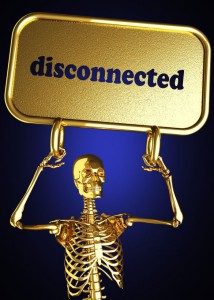
It seems when a funeral director sits down with a family; it’s almost like two people, each of whom speaks a different language, meeting in the room. (Chances are there’s going to be a lot of talking, but very little constructive conversation.) That’s what we call disconnect.
The researchers of the study qualified the nature of this separation. “Funeral industry executives see themselves as caring creators: healing wounds, helping to write the story of a life, building foundations and bridges to the future; weaving and mendin
g the fabric of a community. But consumers don’t see them the same way; in fact, they see funeral directors as robotic rulers. “At worst, they are bullies,” said Marilyn H.; while another woman recognized the reasons why: “They are there to make everything run efficiently. They’ve done this so many
times they are tough, emotionally. They have to switch on to their remote, automatic, robotic.” Study participant John said, “They remind me of some sort of machinery. Not loud, but repetitive. They have a job to do, there are things that need to be done and the guy is doing it.”

Here’s what I think: this disconnect is a wall that has been carefully built by funeral directors. For generations they have lurked in the shadows hiding in a cloak of secrecy. It’s been easier for them to keep the mystery in funeral service and keep the consumers guessing. Yes they like to think of themselves as caring helpers but the complex nature of funeral service has caused them to often seek predictable paths that help them maintain the comfort level they desire to simply get the job done with the least amount of stress possible (and the highest degree of profit).
Funeral directors are “pros” at diffusing any conflicts that come up in the arrangement process. They are not about offering up options that would begin arguments and create more questions of their abilities. Funeral arranging needs to be a creative process that needs to open door to solutions that will embrace individual needs.
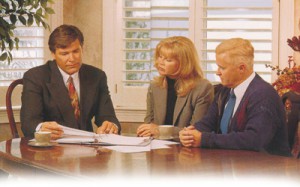
Funeral directors prefer the pick A, B, C or D option nice and tidy ducks in a row with no surprises. While this is expedient, it’s the opposite of what needs to take place to create a funeral service that is as unique as the deceased and the special needs of the survivors.
When funeral directors seek out the easy path, the results become more generic and the resulting funeral is not special. So much so that those in attendance and especially the ones paying the bill will be left with a feeling of “why bother”, and then they say the most dreaded words in funeral service: “Just cremate me and scatter the ashes. Use the saved money to have a party in my memory.” And then they have that party, and we funeral directors look from the outside and say “Gee, I could have helped them plan a much better party that would be so much more meaningful and memorable. I have the know-how and all the best connections to have done this right.” But guess what? It’s too late.
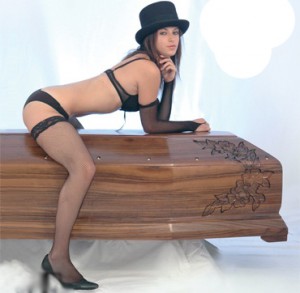
Robin Heppell candidly addressed the issue of “disconnect” in a recent interview with Kim, putting the blame squarely on a primary source of funeral home profits: the casket. “I do think the executives want to see themselves as caring creators; but as a whole, I don’t think they successfully transmit that vision through to their licensed staff because the casket still plays a big role in funeral home profits. If there was little or no profits from caskets, they would be closer to achieving their ideal of being caring creators. As long as caskets have a potential of providing a large amount of profit to a funeral home, their will the conscious or subconscious desire of greater casket sales–and the public isn’t interested in caskets.”
He went on to say, “Until the funeral home is in alignment with consumers, there’s going to be this disconnect. I think the thing is–when you’re able to almost let it go–and truly just give the family what they want and offer things they may not have realized you could, there will be more synergy between the funeral homes and the families they serve.
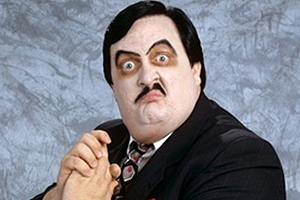 Okay, so consumers do not see funeral directors as the kind of creative resource they are seeking. But it gets worse. One respondent, Marilyn H., spoke about what it was like to plan her sister-in-law’s service: “It felt like we were buying a car.” She went on to describe the situation: “…we were with a man part of the time, then we were with a woman, and then he would come back. Then they put us in this room and on every single wall there was stuff you could buy. It was awful, like (when) you go to a carnival and they have all the prizes.” Synergy? How about just shooting for an experience that is less than “awful”?
Okay, so consumers do not see funeral directors as the kind of creative resource they are seeking. But it gets worse. One respondent, Marilyn H., spoke about what it was like to plan her sister-in-law’s service: “It felt like we were buying a car.” She went on to describe the situation: “…we were with a man part of the time, then we were with a woman, and then he would come back. Then they put us in this room and on every single wall there was stuff you could buy. It was awful, like (when) you go to a carnival and they have all the prizes.” Synergy? How about just shooting for an experience that is less than “awful”?
How Can You Deliver the Kind of Funeral Service Today’s Consumers Want?
When asked to speak about their ideal end-of-life service, one participant said “A memorial service is about celebrating someone’s milestones and accomplishments. For the survivors, it’s good to rehash it all. If they’re in a grieving state, misery does love company. The companionship, the camaraderie. It’s kind of a support group. If someone is really grieving, it helps them cope with it better by sharing these common experiences.”

Another shared “I want plenty of dancing and laughing and having a great time.” What Arlene said next (about a friend’s funeral she had recently attended) was most descriptive of the transformation consumers are looking for. “When we left, everybody was laughing and talking about the person because we saw all the happy moments…everyone was in a festive mood. We didn’t grieve her life, we celebrated her life. I didn’t leave heartbroken. When I walked away from there, I thought they were…still with me. I (was) basking in her achievements and her friendship.”
You can see the problem: today’s consumer doesn’t just want to just “get through” the funeral. They want to create a memorable and healing experience that will form a platform which is strong enough to carry their memories into the future and help them to feel that they are actually part of the legacy of the life lived.
As a funeral director, I believe our biggest value is ability to create a healing environment where people can come together for a memorable experience. This experience should promote those in attendance to support each other in their grief. The life of the deceased is the star and the theme is how that life affected their world and the world of others.
What Does All This Mean for Funeral Home Owner/Operators?
What we may see as the “special need” of today’s consumers–the desire for a truly personal, improvisational and celebratory event which is transformative for all concerned–does create busy work for funeral directors; work they may not have the time or the skill sets to perform. But there is one thing you can do to reduce the workload:
- Hire more specialized part-time employees and rely upon them for the more creative tasks. You should not have to hire more licensed funeral directors to meet the unique needs of today’s families. In truth, doing so could be counterproductive in the long run. Not only could it drive up the cost of the average funeral, chances are it won’t provide families with what they want.
If a specially trained Master of Ceremonies who knows just how to draw on all aspects of a life lived and craft all that information into a well-balanced and touching ceremony would help, then you should be hiring the best Certified Life Celebrant you can find. If you cannot find a good celebrant in your area, you should find a person that you think would be good and pay for their training. (Check out “Not Your Grandparent’s Funeral“, published “way back” in 2012, for a look at the enormous value a certified celebrant can bring to the service.)
- Change the way your licensed staff make funeral arrangements. This is critical; funeral directors must focus more on the event and how it will make people feel. They need to be more aggressive in conveying the options when it comes to the location, look and feel of the ceremony. And the feel of the service can be a very positive reflection on their funeral home.
- Use the latest bells and whistles available. Today there’s a wealth of them: video tributes, custom photo blankets, programs, funeral favors, keepsakes and memorial websites. If any of these will help support the goal of creating a healing experience; then why not use them to the best of your ability?
 The key lies in providing value to the consumer. Value that they can feel moved by. If our services don’t move people to say “Wow! That’s what I want when I die!” we will all become disposers of the dead as people flock to cremation societies and event planners. Never forget the clock is ticking. Chances are your attitude, demeanor and operational skill sets are already costing you customers. If you don’t decide to change your approach, the families in your service area will simply leverage the Internet to get what they want if they don’t feel your funeral home is up to their special needs.
The key lies in providing value to the consumer. Value that they can feel moved by. If our services don’t move people to say “Wow! That’s what I want when I die!” we will all become disposers of the dead as people flock to cremation societies and event planners. Never forget the clock is ticking. Chances are your attitude, demeanor and operational skill sets are already costing you customers. If you don’t decide to change your approach, the families in your service area will simply leverage the Internet to get what they want if they don’t feel your funeral home is up to their special needs.
Let’s Talk

We know you won’t disagree with the fact that consumers are turning away from “traditional funerals” in favor of more celebratory, life-oriented services. But we have made some strong statements here today which you might disagree with; statements like:
1. It’s unfortunate that funeral directors have long defined a funeral as “a traditional service for the deceased at a chapel or church with the casket present”. “It’s the biggest screw-up ever,” said Rob Heppell, who went on to say it’s high time we omitted the focus on a casket. If consumers don’t want an expensive casket, and we define the very word as casket-oriented; then they won’t want it.”
2. As long as caskets have a potential of providing a large amount of profit to a funeral home, there will be the conscious or subconscious desire for greater casket sales. In promoting casket-oriented services funeral home owner/operators are guilty of putting their own needs first and in doing so are their own worst enemies.
3. Funeral directors intentionally built a wall between themselves and the consumer. But, it has now been torn down by the information highway known as “the Internet”. Funeral directors can no longer play “cat and mouse” with the consumer.
4. It’s time for us to get real. We really need to work on our genuineness if we are to build any trust. If we can’t build a genuine trust people will do things themselves. Without trust we cannot effectively convey the real value of funeral service.
Don’t sit and stew over whatever’s on your mind; instead, speak up! Tell us what you’re thinking, and we’ll return the favor.

How about name tags like these at the memorial and reception
Bob Thomas
IBM co-worker
Sue Allen
granddaughter
Peter
Neighbor
How about our “Who among You?” ceremony at the memorial service?
It lets the guests learn who is in the audience that has shared an experience with the person being remembered. The person at the microphone asks the guests to stand if they are connected in a particular way.
Who among you worked with Sue at Acme Dynamite?
Who among you volunteered with her at the Road Runner Rescue Center?
Who among you ate one of her famous pies?
Who among is or was related to her by blood, marriage or relationship? With this one you can also have the people standing give their name and their relationship.
We guarantee the guest interactions will be greatly enhanced and the conversations more meaningful when either of these are done.
Our book and website will have official launch May 27th.
I really like the idea “Who Among You?” …it’s engaging! Certainly the name tags would be a help, especially for those who feel isolated and lonely at such events. Thanks so much, Dave, for your input. Together we can make a difference for the families we serve, and care so much about.
Warm Greetings to One and All … Including ALL Deceased
Hey, Folks
When I ‘Transition’, I Hope that ALL Present have a HUGE PARTY!!!
How, in 2015, do We Humans manage to ‘Depress’ Ourselves, in view of the Peace, Tranquility, and Freedom From Any More Suffering by the Dearly Departed? Hmmm …
Time We All Awaken to the Reality that ‘Transitions’, for One and ALL IS the Reality We Are ALL Facing … Like it or not, Believe it or not, Accept it or not … Such IS The Way of ALL Life On This Planet. So … What to DO?
Make the Most Respectable yet Happy Event for the Deceased to Show Him/Her that WE ALL Truly Appreciated His/Her Presence while Here With Us … and … Offer Him/Her The Greatest Blastoff Possible … With LOVE and Respect … This does NOT Infer Silly or Ridiculous Events or Occurrences. Only … Complete Love and Happiness that The Individual(s) is/are NO Longer Suffering, Hurting, or Are In Pain. Period.
Now … Go Have a Happy, Memorable, and Joyful Souvenir of Celebrating A Truly Wonderful and Memorable Individual(s). Peace Be With One and All …
Abundant Blessings
Namaste
Dr. Garry
I agree wholeheartedly!! I’ve created a company to address this issue – and we are loving how we help families navigate the process while creating unique and extraordinary funeral and memorial celebrations. The Final Celebration is Orange County, CA only Funeral Consultant and Funeral event planner.
Thanks for the great article Jeff!!
I think that this *article* is transformative! Explaining that it’s practically impossible to be 100% committed to the needs of grieving families when the casket sale is so crucial to profit is a rare admission. As a volunteer at a local Funeral Consumers Alliance, as well as having my own business holding workshops for people to plan their own funerals in advance (and have fun doing it), I’ve had a hard time not being critical of this dichotomy in the funeral industry. Having a truly unique and personalized funeral or memorial contradicts any notion that a particular kind of casket is necessary. Your point, Jeff, that people really want more expressive, intimate, transformative experiences is exactly right, and to me, is an example of our growing comfort with death (a wonderful thing!) and desire to be more involved in every aspect of saying goodbye.
I’m so encouraged to read your perspective, I hope your observations and advice become the new norm! We all deserve better funerals than what we’ve always settled for. Why would we not pull out all the stops when honoring someone we loved? But it doesn’t have to do with dollars, it has to do with being engaged and involved and putting our hearts into it, however that may look.
Yes, I agree with you. Trust is the important aspect in funeral services